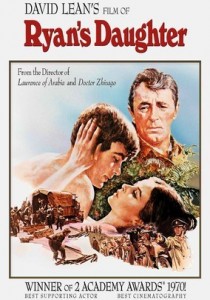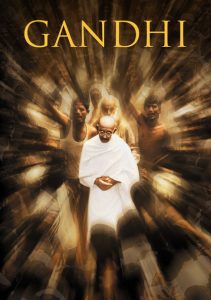Ryan’s Daughter-1970
Director David Lean
Starring Sarah Miles, Robert Mitchum, Christopher Jones
Top 250 Films #87
Scott’s Review #10
Reviewed June 17, 2014
Grade: A
Ryan’s Daughter (1970) is a sweeping epic by the masterful director, David Lean (Lawrence of Arabia, A Passage to India, Doctor Zhivago).
The film is sprawling and filled with fabulous locales of oceanic Ireland. Much of the action takes place using exterior scenes, and this is arguably as prominent and important to the film as the story is.
Set in WWI-era Ireland, one will immediately notice the gorgeous Irish landscapes and the brilliant photography involved. This gives the film a timeless look, and one can escape into the scenery itself, forgetting the story, and dream away through the roaring waves.
The intense “storm scene” is second to none as Lean had to wait over a year to film this pivotal scene- and Mother Nature had to cooperate.
The story is twofold: a love story involving a woman torn between her schoolteacher husband and a strapping, yet English (at this time, there was no love lost between the Irish and English), officer. Rosy (Sarah Miles) is headstrong yet kindhearted, the daughter of a local, prominent man.
Her husband, Charles (Robert Mitchum), is dutiful and loyal to a fault. After Rosy’s affair with the British officer, she is deemed a tyrant by the townspeople, while her husband stands by her side.
The second story is political. A strong sense of nationalism runs through the townspeople toward the British. Both stories blend nicely as small-town gossip, and a subsequent witch hunt comes into play.
The village idiot is played brilliantly by John Mills, who won an Academy Award for his efforts.
The story’s main appeal is character-driven, and the audience will surely feel perplexed about whom to root for or empathize with. I know I did. In fact, at different times, one’s loyalties can fluctuate or be challenged.
The film is reminiscent of Doctor Zhivago (1965) to me, as romance and politics intertwine, and a dilemma involving the central female characters is similar. At over three hours, the film does not drag and remains interesting throughout, as the conflict and drama reach a crescendo in the final act.
At no time is there any filler or unnecessary scenes, which, in itself, is a positive.
Sadly, Ryan’s Daughter is not considered as worthy as other aforementioned David Lean efforts, but I disagree with this- the film ages exceptionally well, like a fine wine.
This film also focuses mainly on a female character and, therefore, is female-driven, a remarkable aspect of the film, circa 1970.
Oscar Nominations: 2 wins-Best Actress-Sarah Miles, Best Supporting Actor-John Mills (won), Best Sound, Best Cinematography (won)

